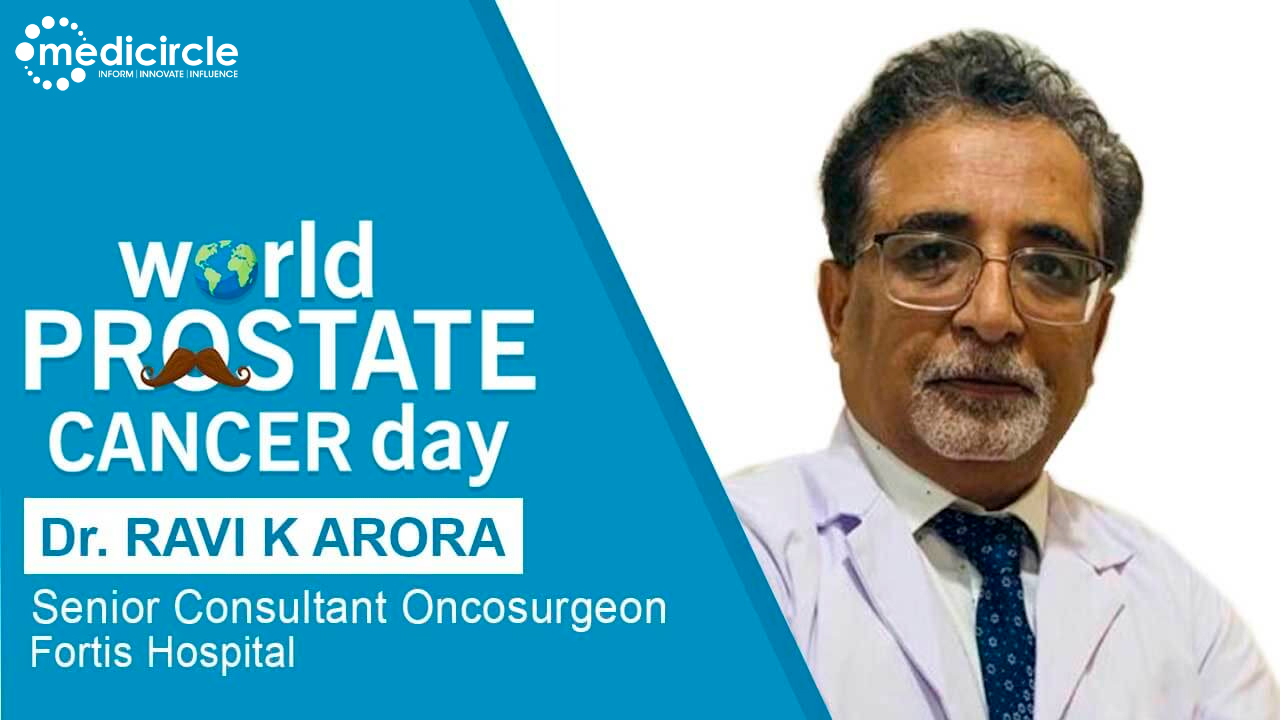Do you know 1 in 8 men are being diagnosed with prostate cancer in their lifetime? Prostate cancer is a severe disease for many adult men. It’s the second most common cancer in men worldwide, and the risk of developing it increases in elderly men. The disease starts when cells begin to grow out of control in the prostate gland. The 5-year survival rate for prostate cancer in India is 64%. Old age, obesity, improper diet, and genetic alterations have been identified as some of the main contributing factors towards an increased cause of prostate cancer. We at Medicircle are conducting the National Prostate Cancer Month Awareness Series to be aware of this problem of prostate cancer which will help you deal with it.
Dr. Ravi K Arora is a Senior Consultant Oncosurgeon at Fortis Hospital, Faridabad. He is an Onco Surgeon with more than 25 yrs. of experience working and being associated with some of the best-dedicated cancer centers in India and abroad. He has been instrumental in setting up surgical oncology in some major centers, which are now vibrant cancer Centres of excellence, like Metro Cancer Centre and Hospital, Preet Vihar Delhi, Nayati Medicity, and Superspeciality hospitals Mathura, Agra, Delhi. He has the credit of performing cancer surgeries on more than 7000 cancer patients.
Dr. Ravi explains, “Prostate cancer is cancer of the prostate. Prostate cancer can be genetic. It has also been observed that 2–3% of patients have prostate cancer in their blood relatives. Some specific genes are associated with prostate cancer. If anyone is having a family history of prostate cancer, they should go for regular testing/screening for the same.
Prostate-Specific Antigen value (PSA Value)
Dr. Ravi mentions, “PSA is a kind of protein that gets secreted from prostate glands. Normal PSA level is 0-4 ng/ml. If this level starts rising, it means tissues are secreting more of this antigen which is an abnormal condition. Patients with a higher level of PSA need to be screened, investigated for the exact cause. Generally, it has been seen that people with high PSA levels are often diagnosed with cancer.
Excessive urination and prostate cancer
Dr. Ravi adds, “Excessive urination can be because of the urinary bladder or prostate glands. So, first, the right evaluation is needed. To overcome this, the patient should not drink water before bedtime and should consult a specialist. There are medicines available that control the hyperactivity of the bladder. Getting up 1-2 times at night for urine is normal but if it is more frequent than this or if the frequency starts obstructing the sleep, then it is a matter of concern. This can be seen in young men also. Men with cystitis, UTI, or prostatitis often face this problem of excessive urination. But normally it is seen in the elderly population.”
Prostate cancer - Dos and Don’ts
Dr. Ravi emphasizes, "We cannot stop prostate cancer but we can surely screen the patient for early diagnosis. An inactive lifestyle is one of the main contributing factors to prostate cancer. It is seen that people who are obese, smoke, drink alcohol, or follow a sedentary lifestyle are at higher risk of developing prostate cancer. So, people should have control on their weight and should follow an active lifestyle. Apart from this, green tea, soya, tomatoes, and calcium intake help decrease the incidences of cancer to some extent.
Secondly, screening is very much important. After the age of 40-45, all men should take annual PSA screening. If there is a family history of prostate cancer, screening should be started at a much early age. By this, we can keep an eye on the changes that are occurring in the prostate gland.”
Prostate cancer symptoms
Dr. Ravi says, “The symptoms include frequent urination, nocturia (increased urination at night), difficulty starting and maintaining a steady stream of urine, haematuria (blood in the urine), dysuria (painful urination).”
Categorization of Stages
Talking about its stages, Dr. Ravi categorizes the disease as,
Stage I (Early stage)– Difficulty in passing urine, PSA marginally raised
Stage II (Locally advanced stage) – Haematuria, difficulty in maintaining a steady stream of urine
Stage III (Advanced stage) – Blood in the rectum, difficulty in passing stools
Stage IV (Metastatic stage) – Pain in spine, weak bladder
Prostate cancer treatment
Dr. Ravi explains, “Diagnosis of prostate cancer is done by PSA, PET Scan. In an early stage, where there are no symptoms but the PSA level is marginally raised, we just perform the biopsy and keep the patient under observation. Prostate cancer can be of two types – aggressive and dormant. The second stage of prostate cancer can be treated with radiation or surgery or cryotherapy. For the third stage of prostate cancer patients, we can use hormonal manipulation. Prostate glands regulate through testosterone. If all this fails, the option left is chemotherapy. So, we can treat this condition using radiation, surgery, hormonal therapy, cryotherapy, chemotherapy, and immunotherapy depending on at what stage the patient comes."
(Edited by Renu Gupta)

 Dr. Ravi K Arora shares his views on prostate cancer. Dr. Ravi emphasizes its early diagnosis. He also talks about its different stages and their available treatment
Dr. Ravi K Arora shares his views on prostate cancer. Dr. Ravi emphasizes its early diagnosis. He also talks about its different stages and their available treatment




.jpeg)
.jpeg)


_(1).jpeg)
.jpeg)
.jpeg)
.jpeg)
.jpeg)
.jpeg)





.jpeg)

.jpeg)

.jpeg)
.jpeg)
_(1)_(1)_(1).jpeg)





